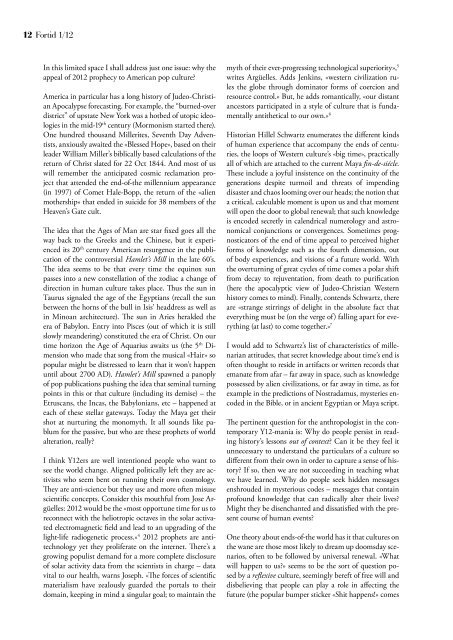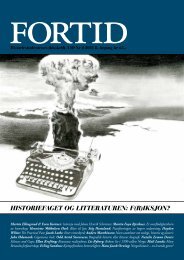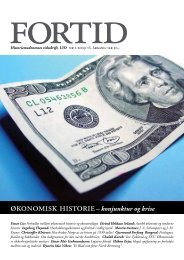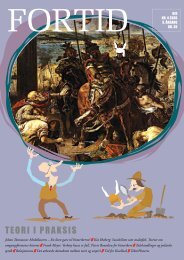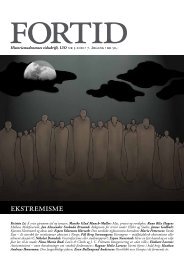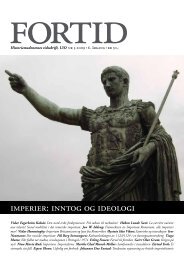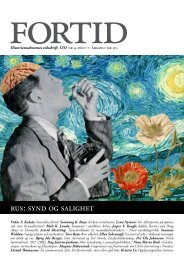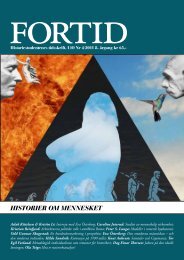Ben Ali-regimets undergang i Tunisia - Fortid
Ben Ali-regimets undergang i Tunisia - Fortid
Ben Ali-regimets undergang i Tunisia - Fortid
Create successful ePaper yourself
Turn your PDF publications into a flip-book with our unique Google optimized e-Paper software.
12 <strong>Fortid</strong> 1/12<br />
In this limited space I shall address just one issue: why the<br />
appeal of 2012 prophecy to American pop culture?<br />
America in particular has a long history of Judeo-Christian<br />
Apocalypse forecasting. For example, the “burned-over<br />
district” of upstate New York was a hotbed of utopic ideologies<br />
in the mid-19 th century (Mormonism started there).<br />
One hundred thousand Millerites, Seventh Day Adventists,<br />
anxiously awaited the «Blessed Hope», based on their<br />
leader William Miller’s biblically based calculations of the<br />
return of Christ slated for 22 Oct 1844. And most of us<br />
will remember the anticipated cosmic reclamation project<br />
that attended the end-of-the millennium appearance<br />
(in 1997) of Comet Hale-Bopp, the return of the «alien<br />
mothership» that ended in suicide for 38 members of the<br />
Heaven’s Gate cult.<br />
The idea that the Ages of Man are star fixed goes all the<br />
way back to the Greeks and the Chinese, but it experienced<br />
its 20 th century American resurgence in the publication<br />
of the controversial Hamlet’s Mill in the late 60’s.<br />
The idea seems to be that every time the equinox sun<br />
passes into a new constellation of the zodiac a change of<br />
direction in human culture takes place. Thus the sun in<br />
Taurus signaled the age of the Egyptians (recall the sun<br />
between the horns of the bull in Isis’ headdress as well as<br />
in Minoan architecture). The sun in Aries heralded the<br />
era of Babylon. Entry into Pisces (out of which it is still<br />
slowly meandering) constituted the era of Christ. On our<br />
time horizon the Age of Aquarius awaits us (the 5 th Dimension<br />
who made that song from the musical «Hair» so<br />
popular might be distressed to learn that it won’t happen<br />
until about 2700 AD). Hamlet’s Mill spawned a panoply<br />
of pop publications pushing the idea that seminal turning<br />
points in this or that culture (including its demise) – the<br />
Etruscans, the Incas, the Babylonians, etc – happened at<br />
each of these stellar gateways. Today the Maya get their<br />
shot at nurturing the monomyth. It all sounds like pablum<br />
for the passive, but who are these prophets of world<br />
alteration, really?<br />
I think Y12ers are well intentioned people who want to<br />
see the world change. <strong>Ali</strong>gned politically left they are activists<br />
who seem bent on running their own cosmology.<br />
They are anti-science but they use and more often misuse<br />
scientific concepts. Consider this mouthful from Jose Argüelles:<br />
2012 would be the «most opportune time for us to<br />
reconnect with the heliotropic octaves in the solar activated<br />
electromagnetic field and lead to an upgrading of the<br />
light-life radiogenetic process.» 4 2012 prophets are antitechnology<br />
yet they proliferate on the internet. There’s a<br />
growing populist demand for a more complete disclosure<br />
of solar activity data from the scientists in charge – data<br />
vital to our health, warns Joseph. «The forces of scientific<br />
materialism have zealously guarded the portals to their<br />
domain, keeping in mind a singular goal; to maintain the<br />
myth of their ever-progressing technological superiority», 5<br />
writes Argüelles. Adds Jenkins, «western civilization rules<br />
the globe through dominator forms of coercion and<br />
resource control.» But, he adds romantically, «our distant<br />
ancestors participated in a style of culture that is fundamentally<br />
antithetical to our own.» 6<br />
Historian Hillel Schwartz enumerates the different kinds<br />
of human experience that accompany the ends of centuries,<br />
the loops of Western culture’s «big time», practically<br />
all of which are attached to the current Maya fin-de-siécle.<br />
These include a joyful insistence on the continuity of the<br />
generations despite turmoil and threats of impending<br />
disaster and chaos looming over our heads; the notion that<br />
a critical, calculable moment is upon us and that moment<br />
will open the door to global renewal; that such knowledge<br />
is encoded secretly in calendrical numerology and astronomical<br />
conjunctions or convergences. Sometimes prognosticators<br />
of the end of time appeal to perceived higher<br />
forms of knowledge such as the fourth dimension, out<br />
of body experiences, and visions of a future world. With<br />
the overturning of great cycles of time comes a polar shift<br />
from decay to rejuventation, from death to purification<br />
(here the apocalyptic view of Judeo-Christian Western<br />
history comes to mind). Finally, contends Schwartz, there<br />
are «strange stirrings of delight in the absolute fact that<br />
everything must be (on the verge of) falling apart for everything<br />
(at last) to come together.» 7<br />
I would add to Schwartz’s list of characteristics of millenarian<br />
attitudes, that secret knowledge about time’s end is<br />
often thought to reside in artifacts or written records that<br />
emanate from afar – far away in space, such as knowledge<br />
possessed by alien civilizations, or far away in time, as for<br />
example in the predictions of Nostradamus, mysteries encoded<br />
in the Bible, or in ancient Egyptian or Maya script.<br />
The pertinent question for the anthropologist in the contemporary<br />
Y12-mania is: Why do people persist in reading<br />
history’s lessons out of context? Can it be they feel it<br />
unnecessary to understand the particulars of a culture so<br />
different from their own in order to capture a sense of history?<br />
If so, then we are not succeeding in teaching what<br />
we have learned. Why do people seek hidden messages<br />
enshrouded in mysterious codes – messages that contain<br />
profound knowledge that can radically alter their lives?<br />
Might they be disenchanted and dissatisfied with the present<br />
course of human events?<br />
One theory about ends-of-the world has it that cultures on<br />
the wane are those most likely to dream up doomsday scenarios,<br />
often to be followed by universal renewal. «What<br />
will happen to us?» seems to be the sort of question posed<br />
by a reflexive culture, seemingly bereft of free will and<br />
disbelieving that people can play a role in affecting the<br />
future (the popular bumper sticker «Shit happens!» comes


